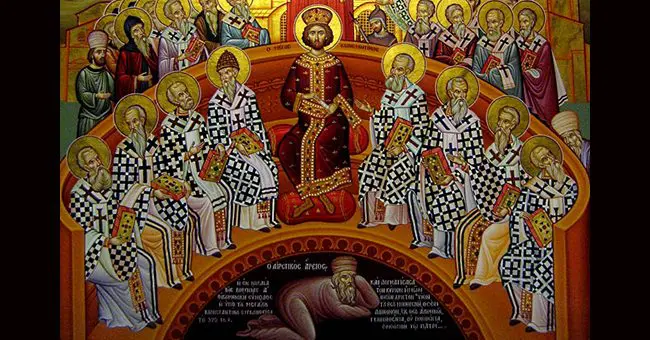It is difficult to determine the exact number of practicing (regular church) Orthodox Christians, it is only certain that the majority of self-identified as such do not know what God’s commandments are or what the Orthodox Catechism teaches, because they are from the so-called “Christmas Christians” ( celebrating Christmas and Easter in a family circle) or, as similar Christians around the world are also called – “four-wheeled Christians”, i.e. those who attend church for the first time in a pram to be baptized, their next entry into the temple is in a wedding limousine, when they enter into a church marriage, and finally they all leave for the last time for the temple, riding in the mourning hearse.
There is a lot of talk in our country in the last decade of the twentieth century that Orthodoxy is the spiritual treasure of the nation and the Fatherland. Most believers sincerely agree with this statement. Everyone is convinced that spirituality is a good thing, that the road to the temple should not be turbulent and that in the spiritual treasury of Orthodoxy the Church of Christ has been accumulating and preserving the values of eternal life for two thousand years. But how can each of us receive our share of this spiritual treasure?
– Through the revival of the Orthodox parish – “The Little Church of Christ”. The purpose of the parish life and the active Orthodox fraternities at the temples is: a) to unite all parishioners more closely around the parish church, b) to teach Christians to read and assimilate the Word of God and the spirit of the Holy Orthodox Church and apply it in life c) to create in Christians a need and habit for heartfelt prayer and for prayerful participation in worship and teaching of common church singing, d) to develop in the Orthodox flock love for one’s neighbor, attracting them to participate in a comprehensive church-charitable and educational activity.
Spreads imaginary asceticism. Many have lost the way of Christ, fallen into unbelief, heresy, or even unbelief. It does not include those of our brothers and sisters who have become interested in all sorts of new religious movements, clairvoyants, psychics and others. occult practices. They are very good Christians, poor in spirit and thirsty for spiritual food, but deprived of the leadership of the Holy Orthodox Church; given to themselves, to their own worldview. It is the duty of the pastors, irrevocably and most urgently and most sacredly, to give the necessary spiritual food to these good Christians and to establish them in the bosom of our native Holy Orthodox Church, from which they have not yet separated, but are in such danger as being deprived of their immediate helm in the transition from earthly human life to the Kingdom of heaven and eternal life after death.
Few people in our time would remember an excerpt from a biography of a Bulgarian or pan-Orthodox saint, no gospel parable, no at least one meaningful saint, no gospel parable, no at least one meaningful theological thought, and almost no one would point to a case where a good deed was prompted by a heard church sermon or a deeply experienced worship service. There are few who, before making their choice, will look to the gospel or consult a priest. Most will consult a horoscope, magician or psychic – clairvoyant, because for them the only criteria are the human mind and private religious ideas and superstitions. It turns out that we live in a country with a “victorious occultism” – a sign of a deep moral and religious crisis.
There is still no functional evidence of the essence of the Orthodox faith in the mass media. Theology and Orthodoxy could not be learned from most printed and ethereal “sketches” on church themes. Media comments and conversations tend to be conducted in two directions: ethnographic-folklore, in the style of folk Christianity with pagan customs and practices.
The Russian religious philosopher Vladimir Solovyov emphasizes that this is exactly the dream of the Antichrist – to close Orthodoxy in a ritual and ethnographic reserve. In The Tale of the Antichrist, which crowns Soloviev’s posthumous work The Three Conversations, the Antichrist, proclaimed president of the globe, hopes to buy the favor of Orthodox Christians by addressing them with the words: “Dear brothers, I know that after you there are those for whom the most valuable thing in Christianity is the Sacred Tradition, the old symbols, the ancient songs and prayers, the icons and the liturgical rite. And in fact, is there anything more precious to the religious soul? Know, beloved, that today I have signed a decree granting huge financial resources to the World Museum of Christian Archeology in order to collect and preserve the monuments of church antiquity. Orthodox brothers, who cares about this will of mine, who can accept me and call me his true leader and bishop, let him step here …! ” – Then the elder Iоan became and declared that “the most valuable thing in Christianity is Christ himself”.
Let us not forget that if we do not speak of Christ, we will not be able to imitate Him in life and work. Our word will cease to be a religious sermon, but will remain a kind of lecture on church history and archeology, in “spiritual cultural massism.”
So, only if we distinguish between what is truly Christ’s in Christianity and what is holy in holy Orthodoxy, will we be able to hope for peace of mind, earthly prosperity and eternal life, because only through the true Redeemer, Savior and God – Lord Jesus Christ, we will overcome the centuries.






